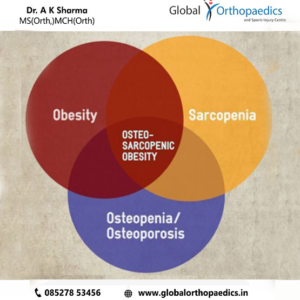Do Obesity and osteoporosis have links?
Many believe the concept that obesity is protective for osteoporosis, which can however not be true. In fact, the new concept of bone marrow fat deposition seen in obesity has begun supporting the harmful effect of obesity on bone health. Thus, obesity might not be well-thought-out as protective for osteoporosis.
 Researches have explored the association between bone and fat at a molecular and cellular level and have led to a far better understanding of various risk factors and pathogenesis basis and to the event of medicine with dual purpose for both osteoporosis and obesity within the future.
Researches have explored the association between bone and fat at a molecular and cellular level and have led to a far better understanding of various risk factors and pathogenesis basis and to the event of medicine with dual purpose for both osteoporosis and obesity within the future.
Obesity as the Risk Factor for Osteoporosis, can cause your bones to become more week and fragile, it’s so brittle that a fall or maybe mild stresses like bending or coughing can cause a fracture. Osteoporosis related fractures usually happen within the hip, wrist, or spine. Bone is additionally a living tissue that’s frequently being weakened and replaced. Osteoporosis occurs when the regeneration of the latest bone doesn’t continue with the loss of old bone.
Many pieces of research have revealed that obese postmenopausal women are almost as likely to fracture as non-obese women, whose poor mobility with increased risk of falls may play an important role. These research findings have significant implications for public health due to the quickly rising numbers of obese individuals within the population.
Almost one in four postmenopausal women with fractures is obese. The upper arm, lower leg, and ankle were considerably more likely to be affected in obese than non-obese women with a prevalent fracture, whereas fractures of the wrist, hip, and pelvis were considerably less common than in non-obese women.
 When it comes to comparison to non-obese women, obese women with a prevalent fracture are more likely to be current cortisone users, to report early menopause, to report fair or poor general health, to use arms to help to stand from a sitting position and to report added two falls in the past year.
When it comes to comparison to non-obese women, obese women with a prevalent fracture are more likely to be current cortisone users, to report early menopause, to report fair or poor general health, to use arms to help to stand from a sitting position and to report added two falls in the past year.
Medications, proper diet, and weight-bearing exercise can help postpone a bone loss or toughen already weak bones. Obesity is often a risk factor for frail bone disease osteoporosis, consistent with various studies.
Hence, it’s advisable to remain healthy, stay fit, and remain lightweight!
To know more about it consult Dr. A.K Sharma@ https://prac.to/dr-a-k-sharma-orthopedist-dir
Stay Safe! Stay healthy
Stay Safe, Stay Home.


